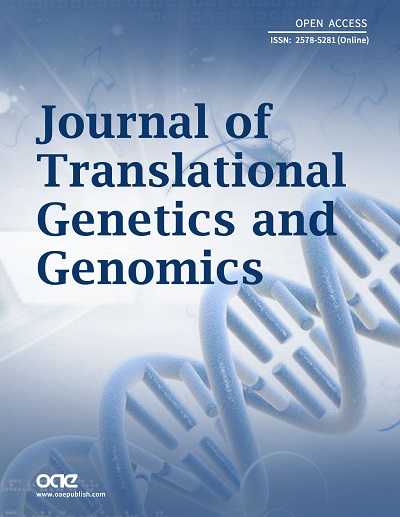
Topic: Genetic Diagnosis and Treatment of Duchenne Muscular Dystrophy
A Special Issue of Journal of Translational Genetics and Genomics
ISSN 2578-5281 (Online)
Submission deadline: 30 Jun 2025
Guest Editor(s)
Special Issue Introduction
It is widely recognized that academic achievements in this field have been highly fruitful, with significant social impact and media attention, alongside recognition from Patient Associations.
Duchenne muscular dystrophy, characterized by progressive proximal weakness[1], dilated cardiomyopathy, and heart dilatation, is caused by out-of-frame genetic mutations in the dystrophin gene. Additionally, mental deterioration occurs in one-third of Duchenne muscular dystrophy cases, and in both Duchenne and Becker muscular dystrophies (DMD, BMD), cortical atrophy is associated with minimal ventricular dilatation and white matter abnormalities[2]. Diagnostic tools for dystrophinopathies include creatine kinase assay, haplotype analysis, Southern blot analysis, immunological analysis, multiplex PCR, multiplex ligation-dependent probe amplification, Sanger DNA sequencing, and next-generation DNA sequencing.
Pharmacological therapies for dystrophinopathies comprise glucocorticoids (prednisone, prednisolone, and deflazacort), vamorolone, and ataluren. However, it is noted that glucocorticoid therapy can exacerbate bone loss and osteoporosis. Additionally, angiotensin-converting enzyme inhibitors, angiotensin receptor blockers, and β-blockers are considered the first-line treatments to prevent dilated cardiomyopathy in dystrophinopathy patients. Gene therapy strategies for Duchenne muscular dystrophy involve gene transfer, exon skipping, exon reframing, and CRISPR gene editing. Notably, eteplirsen, an antisense-oligonucleotide drug for skipping exon 51 from the Dystrophin gene, is available on the market and may help up to 14% of Duchenne muscular dystrophy patients. Ataluren has been used to stop codon mutations and is also used in female carriers.
Becker muscular dystrophy presents with a heterogeneous phenotype, and its treatment remains under investigation[3]. With treatments such as corticosteroids, assistedventilation, spinal surgery, and management of cardiomyopathy-related heart failure, DMD patients can survive up to 40 years, although challenges exist due to the large size of the full DMD gene, which complicates delivery via adeno-associated virus vectors. In 2023, Sarepta Therapeutics received accelerated approval for delandistrogene moxeparvovec (SRP-9001), an adeno-associated virus gene therapy for Duchenne muscular dystrophy, offering promising prospects for Duchenne muscular dystrophy patients. SRP-9001 codes for a shortened form of dystrophin (“microdystrophin”), and pioneering research is on the way.
To all researchers in the field, I extend my sincere gratitude for your invaluable contributions to Dystrophinopathy research. I sincerely encourage you to submit case reports, minireviews, or outstanding translational research, as they hold substantial potential to alleviate the burden and socioeconomic impact caused by these disorders, thus contributing to improving the quality of life for affected families and caregivers.
References:
1. Saad FA, Siciliano G, Angelini C. Advances in dystrophinopathy diagnosis and therapy. Biomolecules. 2023;13(9):1319. doi: 10.3390/biom13091319
2. Angelini, C.Pinzan, E.Advances in imaging of brain abnormalities in neuromuscular disease. Ther Adv Neurol Disord. 2019;12:1756286419845567. doi: 10.1177/1756286419845567. eCollection 2019.
3. Angelini, C. Development of the precision diagnostics and treatment for Duchenne/Becker muscular dystrophy. Front Neurol. 2024;15:1396816.
doi: 10.3389/fneur.2024.1396816. ECollection 2024.
Submission Deadline
Submission Information
For Author Instructions, please refer to https://www.oaepublish.com/jtgg/author_instructions
For Online Submission, please login at https://oaemesas.com/login?JournalId=jtgg&SpecialIssueId=jtgg240612
Submission Deadline: 30 Jun 2025
Contacts: Jixiang Zhao, Assistant Editor, jixiang.zhao@jtggjournal.com







